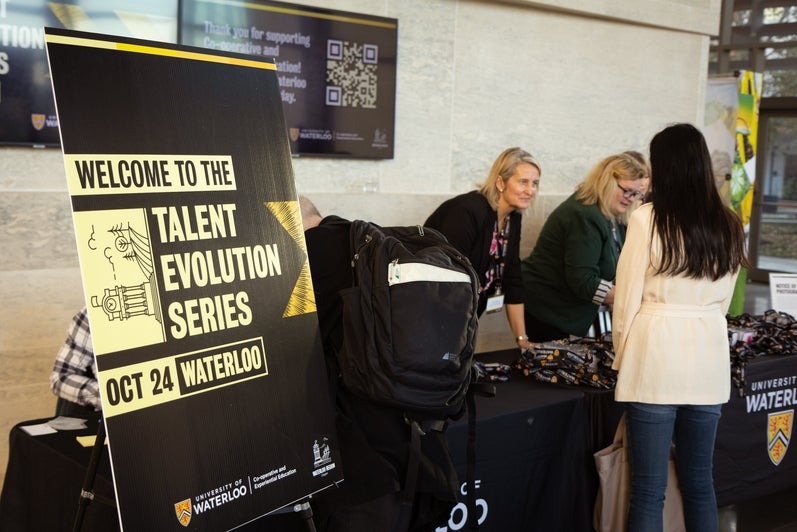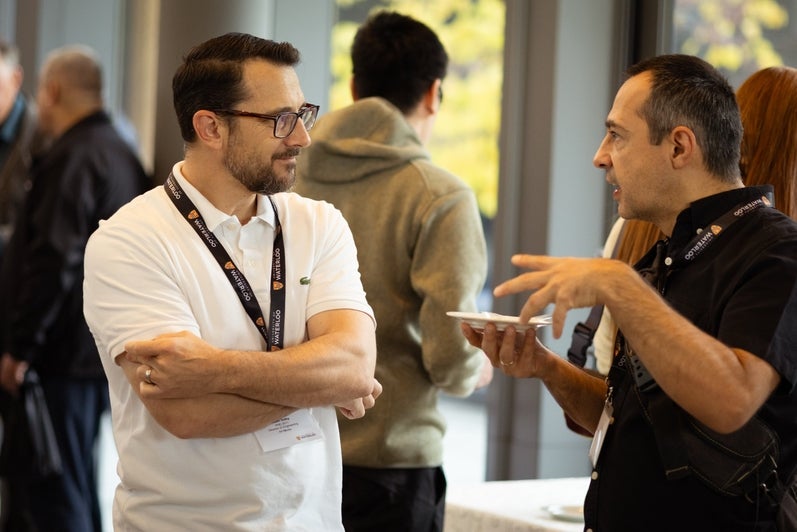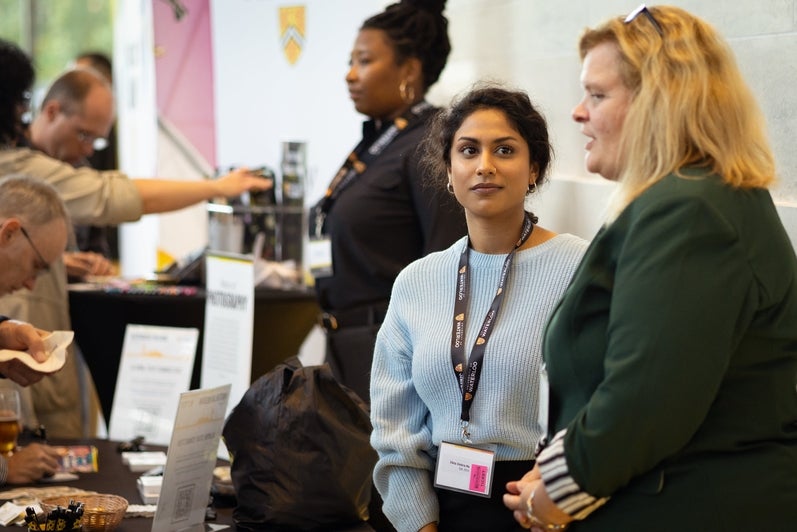Five ways AI will change the future of work
By: Namish Modi (he/him)
Employers, students and faculty discuss tactics to tackle artificial intelligence at work.
How will artificial intelligence (AI) impact the future of work? Panelists at
Co-operative and Experiential Education (CEE)’s Talent Evolution Series have the answer.
On October 24, the panel hosted by Dr. Norah McRae, CEE’s associate provost, explored how employers, students and institutions are tackling the question of the impact of AI in the future of work.
Panelists included:
- Ellen Shao, student, Financial Analysis and Risk Management, University of Waterloo
- Dr. Catherine Burns (BASc ’92), associate vice-president health initiatives and professor, Systems Design Engineering, University of Waterloo
- Joseph Fung (BASc ’07), CEO of Uvaro
We want to thank our panelists and guests for making this event such a success!
How is AI changing the future of work?
Here are the five main insights from the panel discussion:

1. Humans remain key to the workplace while AI is a tool.
Let's not fret. We humans are still a key component of the workforce. We aren’t being replaced anytime soon.
Humans will continue to be the important decision-makers in the workplace. People have necessary critical thinking skills and those can't be replaced by AI.
“Their roles may change, and AI is going to become an input. At the end of the day, the most successful applications of AI are going to be those that augment and help people do their jobs,” says Burns.

2. AI increases efficiency by managing repetitive tasks.
In terms of efficiency, AI can be an important tool. Repetitive tasks are especially manageable, according to Shao.
She doesn’t believe AI is a replacement for jobs, but a tool to assist in them. Shao utilized AI tools to work more efficiently during her work term at Dundas Life.
“It improves the student’s skill to adapt to new technology and also to think critically about how we should use the technology more efficiently in the workplace,” says Shao.“Students are an important bridge between education and industry.”
“We’ll all end up using a variety of tools that we can’t fully imagine right now. It’s at the same stage as before we started using smartphones, and now most of us can’t manage getting through the day without them,” he says.

3. Experiment using AI.
AI is changing the workforce landscape and creating a time of major transition.Burns believes the best way to master the use of AI is through experimentation and learning.
Shao says the most frequent word she heard during her co-op term is “experiment” to determine how to best get the best results from the AI technology.
Co-op students are positioned to help both employers and their educational institutions. They can offer strategies to implement AI for productivity while sharing their experiences during academic terms as well as help fellow students in future work terms.

4. AI is a great recruitment tool.
Generative AI can be positive for recruitment. Fung notes that AI is especially useful for “skill compression.” For anyone hiring for a role they aren’t experienced in, such as an HR professional hiring an accountant, AI tools can be used in the recruitment process to identify key skills needed for the role. AI tools can also help to develop interview questions and filter through candidates.
Burns thinks AI can help identify overlooked candidates.“What if it (AI) found new places that we could recruit, that changed the way we looked at the world? I think it has the potential to find some of those patterns that could be exciting and open opportunities for people,” says Burns.

5. Consider the impact on EDI.
The panelists emphasized a shared responsibility to ensure that biases that exist in society are not reinforced in AI tools in the realm of equity, diversity and inclusion (EDI).
According to Fung, it is essential to build AI systems that evaluate for bias. “The reality is, we’re going to see many technologies come out. We’re already seeing AI technologies that can identify or predict violence or crimes, use facial recognition to identify wanted criminals or things like that,” says Fung. “In each of those situations, poor processes in the data sets, or processes in algorithm development, that’s the thing that generates bias.”
Burns highlighted the challenge for all of us is to develop broader data sets. Students can also play a role by using their creativity to utilize AI technology.
What can Waterloo do?
Waterloo’s CEE team has a role to play in helping develop their skills for the future workplace. This work includes:
- Upskilling students to use AI in their careers.
- Understanding how employers are recruiting. Are they using AI to find that perfect match? We must understand how to best continue our partnership with employers.
- Exploring AI to develop creative solutions for how we engage with our students, employers and community partners.
“We’re reading, exploring and talking to valued partners and people who have more experience in this space than we do, to start grappling with these important questions,” says McRae.
Did you know?
October is United Way month at the University of Waterloo. A month when departments and units across the campus campaign and create events to raise money for United Way Waterloo Region.
CEE developed the Co-op for Community program, which enables students to work for nonprofits located in Waterloo – this year the fund benefits United Way and its affiliated agencies across the region. The CEE fund supports Co-op for Community.













